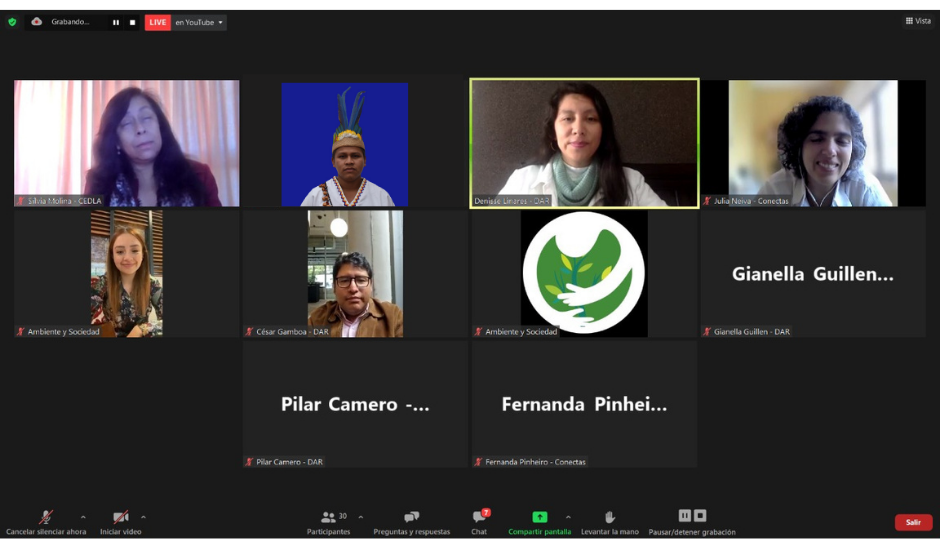On April 21, within the framework of the first Conference of the Parties to the Escazu Agreement that took place in Chile, the event was held: “The Escazu Agreement, a fundamental tool for the effective protection of the Amazon biome.” In this event, representatives of civil society organizations and of the indigenous peoples of the Amazon reflected on the Escazu Agreement, the advance in terms of the protection of rights that it represents, and the challenges for its application, which it entails, as a previous step, to its ratification in countries such as Brazil, Colombia and Peru.
It is precisely in these countries that the greatest number of alerts are concentrated due to cases of murders and threats against human rights defenders in environmental and climate matters, as well as an increase in social and environmental conflicts due to the advance of extractive activities, infrastructure, trafficking of land and drug trafficking.
In this regard, Vanessa Torres from the Environment and Society Association – AAS (Colombia) pointed out that, there is a direct relationship between the threat of those who defend the territories and the lack of knowledge about the rights of these people. Access rights are quite limited in Colombia. Faced with this, these spaces for dialogue are relevant to remind the institutions and citizens that the Escazu Agreement is a regional achievement of the citizens and of those of us who participate in these processes, this goes beyond a government program and we believe that This has to be ratified by the different States of the region, it is a regional dialogue from which we cannot be far from Colombia, which is a country with the highest figures of violence against the defenders of the territory.
For his part, Óscar Daza, indigenous leader, Human Rights coordinator of the National Organization of the Indigenous Peoples of the Colombian Amazon, and representative of the Coordinator of the Indigenous Organizations of the Amazon Basin (COICA) affirmed that “The Amazon basin awakens a very broad interest on the part of developed countries and the approach to this region has been trampling on the rights of indigenous peoples. To date and so far, this year, 25 massacres have been evidenced in Colombia. Faced with this, we organize ourselves for the effective exercise of our rights, through different spaces and mechanisms such as the Program for the Defense of Indigenous Defenders of COICA and its bases, which must be strengthened. He also pointed out that, “the objective of this COP to guarantee the protection of indigenous defenders should not remain only on paper, much less in what is promised at this meeting, but that they appropriate the Escazu Agreement for the respect of their rights”.
Also on the issue of environmental defenders, César Gamboa of Law, Environment and Natural Resources – DAR (Peru), pointed out that in Peru institutional arrangements have been made for the protection of defenders but they still need to be profiled towards specific responsibilities for defense defenders, and this involves the implementation of guidelines for the National Police of Peru and the Ministry of the Interior, which have not yet been given, such as financial resources and police officers who are dedicated to the defense of these defenders. Therefore, without the political decision to ratify the Agreement, Peru is falling behind.
Julia Neiva from Conectas and Human Rights (Brazil), indicated that “In the Brazilian context we have provisions that promote justice in environmental matters, but the Escazu Agreement is an opportunity to create more parameters, principles and the strengthening of governance. Brazil is one of the 4 deadliest countries for land defenders, illegal mining has been one of the main drivers of violence in the countryside. It is important to disclose the attacks on defenders and also the attacks on the rights of access to information, we need pressure from international organizations such as CEPAL, the UN, to ratify the Agreement, it is an emergency”.
In the case of Bolivia, Silvia Molina from the Center for Studies for Labor and Agrarian Development – CEDLA (Bolivia) said that Bolivia quickly ratified the Escazu Agreement, but Bolivia does not have a law on access to information. In turn, confidentiality clauses are becoming an everyday thing, for example, in trade agreements and loans with China. Regarding the situation of defenders in Bolivia, he pointed out that “it is quite serious, since there are attacks from the government that come to discredit us by saying that they are defenders of the right or indigenous leaders are questioned for the fact that they have had a university education. Faced with this, the Escazu Agreement proposes us to carry out an organized society to build independent citizen agendas effectively, which seeks to transform power relations in decision-making”.
The progress made during the first day of the COP in Chile was also mentioned at the event, for example, countries like Mexico have declared that they are going to provide financing for the voluntary contribution fund, which is key to the materialization of the Agreement; then, and one of the most important steps for indigenous peoples is the implementation of a committee of defenders, and a committee of indigenous peoples within the conference of the parties to the Escazu Agreement.
The event was co-organized by the AAS, CEDLA, Conectas Human Rights, DAR; and COICA.
You can see the event at this link.


